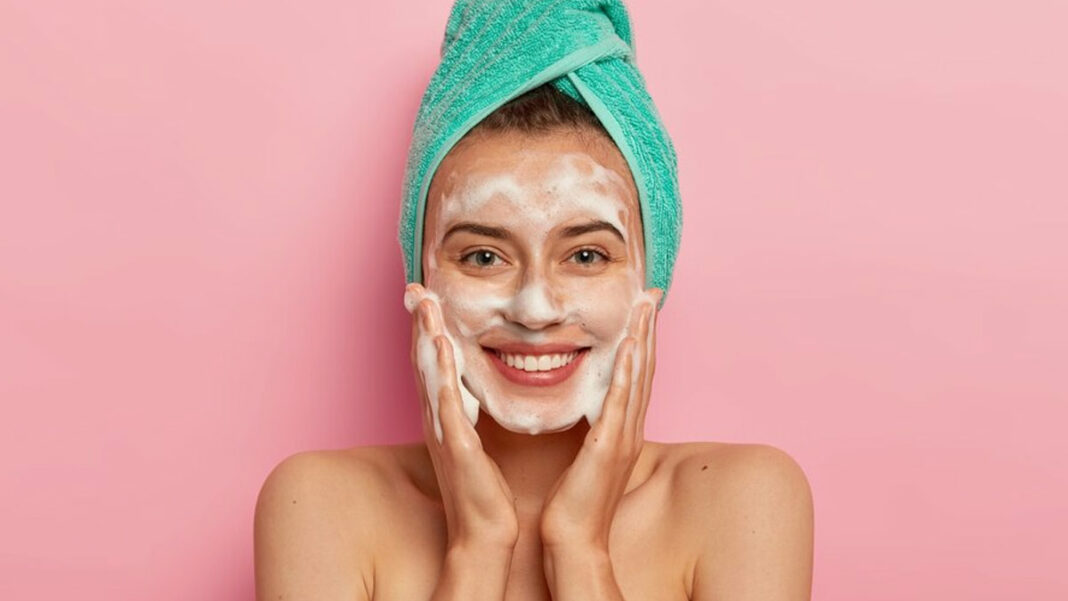For someone who is enthusiastic about their skin health, knowing every minute detail about your skincare products is crucial. This also includes the basics, such as your cleansers and face wash. Have you ever wondered why the two are advertised as separate entities? Even though many people use the two terms interchangeably, experts suggest that the two products are different despite having the same functions. If you’re curious to know the whys and hows of it all, read to find out. What Is A Cleanser? Dr Geetika Srivastava, Dermatologist and Founder of Influennz Skin and Hair Clinic, says that cleansers serve as the initial line of defence against environmental pollutants, excess oil, makeup residue, and accumulated skincare products. She shares that cleansing forms the bedrock of a healthy complexion. Also Read: Skincare Ingredients For Acne-Prone Skin: Here’s What To Look For In A Face Wash, Serum, And Moisturiser Most cleansers contain a key ingredient called surfactant, which acts as tiny magnets that, on the one end, are attracted to water and, on the other, are attracted to oil and dirt. When you apply the cleanser and rinse, these chemical compounds lift away impurities and wash them away. Now you would argue that soap could do the same. But it is important to note that cleansers are generally formulated to be gentler on facial skin, with a pH level closer to your skin’s natural balance to avoid irritation. How Is It Different From Face Wash? While both cleansers and face wash share the common objective of purifying the skin, their formulations and functions diverge in nuanced ways, says Dr Srivastava. Some of the key differences between them include: Lather capacity: Cleansers usually do not form too much lather, which is commonly associated with facewash. This absence of lather not only prevents the post-cleansing sensation of parched skin but also ensures a gentler cleansing experience, says Dr Srivastava. Gentleness: Cleansers emerge as the gentler alternative to face wash and cleanse without stripping the skin of its natural oils. Unlike face wash, which often harbours harsh detergents, cleansers prioritise a delicate balance, making them particularly suitable for sensitive or dry skin types. Hydration potential: Cleansers offer a replenishing boost to parched skin. With formulations ranging from creamy to gel-like or watery textures, cleansers infuse the skin with moisture, fostering a supple and hydrated complexion. Texture of the product: While cleansers embody a spectrum of textures, including creamy, milky, or gel-like consistencies, face wash is characterised by its foamy demeanour, eliciting a refreshing cleansing experience. Also Read: Explainer: Can Sunscreen Protect Against Skin Cancer? Who Should Use A Cleanser? Cleansers are ideal for: Sensitive and dry skin When frequent face cleansing is required (after the gym,after cleaning the room, after being in a dusty environment). When you mostly stay indoors When you don’t use makeup, generally When undergoing skin procedures like a chemical peel, microneedling, or laser When exfoliating, products like retinol, AHA, and BHA serums are part of your skincare routine. Who Should Use A Face Wash? Face washes are ideal for: Oily, normal, or combination skin types Individuals donning makeup regularly or navigating through bustling urban environments. Dr Srivastava says, “The frequency of use should not be more than twice for a face wash and not more than three for a cleanser. However, if there is a need to cleanse the skin more than twice, either due to a workout or being in a dusty place, it’s best to use a cleanser.” What Is Ideal For People Who Use Makeup? For people who apply makeup regularly or apply heavy makeup, Dr Srivastava recommends double-cleansing. She explains, “Makeup, especially the heavy ones, is loaded with oil-based products such as highlighter, blush, mascara, and lipsticks. These oil-based products are not removed with a cleanser or a facewash alone. In such instances, double cleansing needs to be practised.” Double cleansing consists of two steps: Step 1: To remove the oil-based stains and makeup first, use an oil-based cleanser such as micellar water (for oily skin) or cleansing balm (for dry or sensitive skin). Step 2: Use water-based face washes to remove residual makeup, dirt, and oil from the skin. However, if you have to choose one, choose a cleanser for makeup removal and not a face wash because cleansers are cream based and better suited for makeup removal than face washes which are purely water based, she concludes.Read NextGlycolic Acid vs Salicylic Acid: How to Choose the Right Exfoliant for Your Skin?Disclaimer All possible measures have been taken to ensure accuracy, reliability, timeliness and authenticity of the information; however Onlymyhealth.com does not take any liability for the same. Using any information provided by the website is solely at the viewers’ discretion. In case of any medical exigencies/ persistent health issues, we advise you to seek a qualified medical practitioner before putting to use any advice/tips given by our team or any third party in form of answers/comments on the above mentioned website.
